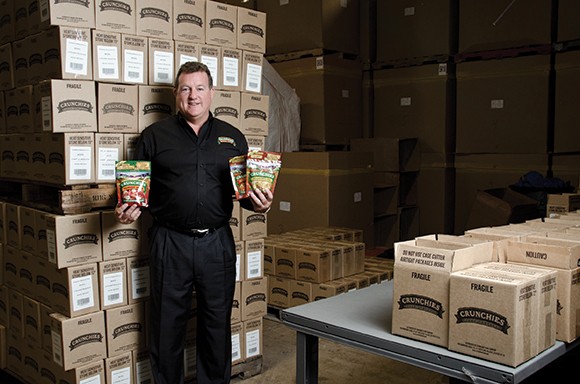
Crunchies CEO Jim Lacey at the company’s Westlake Village headquarters, were the company is cutting jobs and trimming costs in a Chapter 11 reorganization. (Business Times file photo)
When Crunchies Food Co. emerges from its Chapter 11 reorganization in about 10 weeks, the new company will have a smaller regional presence but substantially less debt, according to its CEO.
“The outlook at the end is that we’re going to be a much leaner company,” Crunchies CEO and President Jim Lacey told the Business Times in a Sept. 2 interview, about three weeks into the 13-week Chapter 11 bankruptcy process. “Our goal is to have a balance sheet that should be very clean. Some of our shareholders that have loans will be converting that to stock. So we shouldn’t have much debt on the books. But we will have a smaller team so we’ll be building it back up slower.”
Last month, the Westlake Village-based freeze-dried snacks maker filed for Chapter 11 bankruptcy protection, alleging that one of its largest vendors is attempting a hostile takeover in a bid to gain a fast-growing brand and a foothold into the U.S. market.
The vendor, a freeze-dried fruit supplier based in the United Kingdom, has responded that it will lobby other creditors to wind down Crunchies through a private-liquidation process in an attempt to get its funds back.
Since filing for bankruptcy protection on Aug. 15, Crunchies has laid off eight people — about a third of its full-time staff — at its Westlake Village headquarters, Lacey said. It has reduced expenses by about $2 million, he said, and has put marketing initiatives and new product development on hold for the rest of the year.
The Chapter 11 filing, in which Crunchies lists more than $10 million in assets and $10 million in debts, came after the firm defaulted on payment plans with suppliers. One of those suppliers is Chaucer Foods, a maker of freeze-dried strawberries based in the United Kingdom that is owed about $1 million. Chaucer has moved aggressively to have Crunchies’ assets liquidated.
Crunchies has said it believes the liquidation attempt by Chaucer Foods is actually a hostile takeover. Chaucer “used the settlement discussions to feign interest in making an equity investment” in the company, “only to pounce upon [Crunchies] with an orchestrated hostile takeover in the form of a proposed assignment for the benefit of creditors that would wipe out most unsecured creditors and equity,” Crunchies alleges in its bankruptcy filings.
Lacey claims that the British firm, a major supplier of freeze-dried strawberries for Kellogg’s cereals, colluded with the Chung family trust, an investor and creditor to Crunchies, to starve it of much-needed cash.
Chaucer sent a team from the global accounting firm KPMG to evaluate Crunchies after the Westlake Village firm offered to convert the $1 million it owed Chaucer into equity, Lacey alleges. That two-week visit turned into a 10-week due-diligence process, Lacey said.
“You don’t send a whole team from the U.K. at that expense just to invest $1 million,” Lacey said. “[Chaucer doesn’t] have a brand. They’re really a raw-materials supplier. Given that, we’re a perfect way for them to get into the U.S. and grab the No. 1 freeze-dried snack. They thought they could get Crunchies by starving us of cash and buying us very cheap. They thought they could get a company that’s worth between $15 million and $30 million and buy it for $3 million.”
Chaucer has responded that it is simply attempting to get the money it is owed after Crunchies failed to come through on several repayment plans. Attorneys representing Chaucer did not respond to requests for comment.
Responding in bankruptcy court filings, the British firm said that after Crunchies twice failed to pay it $1.5 million owed for freeze-dried fruit, it is working on an agreement that will sell Crunchies’ assets and distribute the proceeds to its creditors. “The debtor’s inability to generate positive cash flow has nothing to do with Chaucer,” the British firm said in court filings. “Chaucer was a supplier that the debtor failed to pay, resulting in a lawsuit and a writ of attachment. After reaching a settlement with Chaucer, the debtor defaulted on the parties’ mutually-agreed repayment plan.”
Chaucer said it proposed an assignment for the benefit of creditors, or ABC, which is a private liquidation process that would sell all of Crunchies’ assets so the proceeds could be used to repay its creditors. In an ABC, the sale of assets and distribution of proceeds are overseen by a third-party company rather than by a court-appointed trustee.
In the proposed ABC, Crunchies’ assets would be sold in exchange for the cancellation of its entire $7 million in secured debt and a waiver of Chaucer’s outstanding $1 million unsecured claim, according to Chaucer. The ABC would result in “the payment of substantial money to the assignment estate, which would have provided a return to general unsecured creditors,” Chaucer said.
Chaucer said it is in “active discussions” with the Donald Delaski Revocable Trust and the Chung Family Trust, Crunchies’ largest secured creditors, to get an ABC agreement in place. An attorney representing the Chung trust did not respond to a request for comment.
Crunchies last year ranked as the third-fastest-growing firm based in the Tri-Counties, with revenue between 2010 and 2012 jumping 427.3 percent to $11.6 million, according to Business Times records.
Crunchies said its products — fruit and vegetable snacks that are freeze-dried using its propriety process — are in about 26,000 stores around the U.S. The firm claims it has a 51 percent share of the freeze-dried snack market and is the fastest-growing brand in both the freeze-dried and dried-fruit snack categories. It has deals with Safeway, Walmart, GNC, Kroger, Sprouts, Whole Foods Market and several wholesalers such as Tree of Life, McLane and UNFI.
Lacey, a former Nestlé, PowerBar and Gillette manager who started with Crunchies in 2006, said the business has experienced growing pains, especially during the recession. “As you’re growing and building your business and bringing on accounts like Costco, your demand for building inventory becomes intense,” he said.
Last year, Crunchies was valued at about $15 million as a going concern for the purposes of raising new capital, according to the Westlake Village firm. That valuation comes from using a multiple of revenue, minus debt. The company said its tangible assets include about $900,000 in accounts receivable and $2.3 million of inventory, valued at cost. The value of its brands, trademarks and other intellectual property is unknown, it said.
If the business is shut down and liquidated, the value would be less than $3.5 million, according to Crunchies.
“This [reorganization] experience has been very tough for everyone involved,” Lacey said. “It’s not easy laying people off after you’ve built a team. … But after we come out of this, we’re going to be a new company with a complete recapitalization.”
[CORRECTION: An earlier version of this article referred to Crunchies Food Co. CEO and President Jim Lacey as the company’s founder. Lacey first started with the business in 2006 as a consultant, and later became its chief executive.]






 Print
Print Email
Email

















